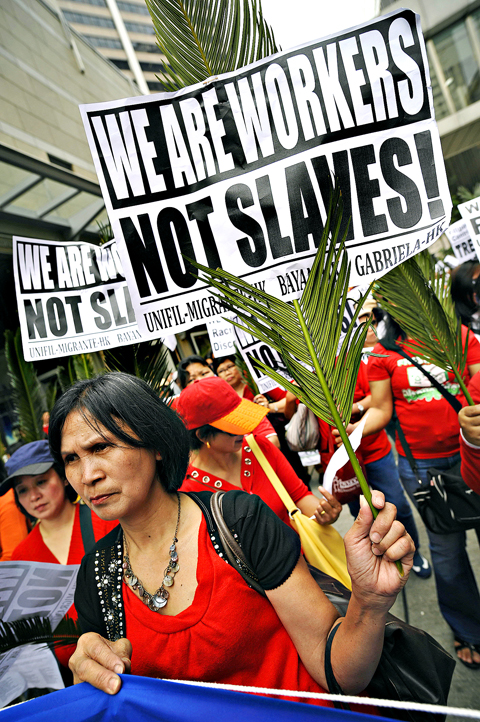Hundreds of Filipinos marched through central Hong Kong yesterday to protest a newspaper column denounced by the Philippine community as representative of racism they say is endemic in the Chinese territory.
Hong Kong columnist Chip Tsao (曹捷) made a public apology earlier this week, saying he had not intended to insult Filipinos with what he characterized as a satirical article poking fun at Hong Kongers’ poor treatment of their maids.
But hundreds of Filipinos still protested yesterday in the Central financial district. Marching peacefully, many wearing red T-shirts, they carried signs that said “No Chip shots at Filipinos” and “We are workers, not slaves.”

PHOTO: AFP
About 130,000 Filipinos work as maids in wealthy Hong Kong to help support their families back home. They make a minimum monthly salary of HK$3,580 (US$462).
In the article published on Friday in the weekly HK Magazine, Tsao wrote he was so angered by the Philippines’ claim on the disputed Spratly Islands, which China also claims, that he summoned his Philippine maid to give her a lecture.
Calling the Philippines “a nation of servants” that shouldn’t challenge China, he wrote that he would be forced to fire her in the event of a war between the two countries.
Protest organizer Eman Villanueva said Tsao’s column was an example of larger racism toward ethnic minorities in Hong Kong.
“This is also beyond Chip Tsao because Chip Tsao’s article is just a symptom. It’s not the main problem. The problem is racism. The problem is the unfair treatment of ethnic minorities in Hong Kong,” Villanueva told Hong Kong’s Cable TV in an interview.
Tsao said yesterday he had no further comment.
Philippine activists criticized the article and the Philippine government put Tsao on an immigration blacklist.
“He targeted and insulted the Philippine people, the Philippine nation and in particular Filipino domestic helpers in Hong Kong,” Villanueva said in a phone interview.
Philippine Foreign Affairs spokesman Ed Malaya said yesterday the Philippine Consulate in Hong Kong had recommended that the ban on Tsao visiting the country be lifted after he apologized and “indicated interest to visit the country some day.”

‘TERRORIST ATTACK’: The convoy of Brigadier General Hamdi Shukri resulted in the ‘martyrdom of five of our armed forces,’ the Presidential Leadership Council said A blast targeting the convoy of a Saudi Arabian-backed armed group killed five in Yemen’s southern city of Aden and injured the commander of the government-allied unit, officials said on Wednesday. “The treacherous terrorist attack targeting the convoy of Brigadier General Hamdi Shukri, commander of the Second Giants Brigade, resulted in the martyrdom of five of our armed forces heroes and the injury of three others,” Yemen’s Saudi Arabia-backed Presidential Leadership Council said in a statement published by Yemeni news agency Saba. A security source told reporters that a car bomb on the side of the road in the Ja’awla area in

‘SHOCK TACTIC’: The dismissal of Yang mirrors past cases such as Jang Song-thaek, Kim’s uncle, who was executed after being accused of plotting to overthrow his nephew North Korean leader Kim Jong-un has fired his vice premier, compared him to a goat and railed against “incompetent” officials, state media reported yesterday, in a rare and very public broadside against apparatchiks at the opening of a critical factory. Vice Premier Yang Sung-ho was sacked “on the spot,” the state-run Korean Central News Agency said, in a speech in which Kim attacked “irresponsible, rude and incompetent leading officials.” “Please, comrade vice premier, resign by yourself when you can do it on your own before it is too late,” Kim reportedly said. “He is ineligible for an important duty. Put simply, it was

SCAM CLAMPDOWN: About 130 South Korean scam suspects have been sent home since October last year, and 60 more are still waiting for repatriation Dozens of South Koreans allegedly involved in online scams in Cambodia were yesterday returned to South Korea to face investigations in what was the largest group repatriation of Korean criminal suspects from abroad. The 73 South Korean suspects allegedly scammed fellow Koreans out of 48.6 billion won (US$33 million), South Korea said. Upon arrival in South Korea’s Incheon International Airport aboard a chartered plane, the suspects — 65 men and eight women — were sent to police stations. Local TV footage showed the suspects, in handcuffs and wearing masks, being escorted by police officers and boarding buses. They were among about 260 South

A former flight attendant for a Canadian airline posed as a commercial pilot and as a current flight attendant to obtain hundreds of free flights from US airlines, authorities said on Tuesday. Dallas Pokornik, 33, of Toronto, was arrested in Panama after being indicted on wire fraud charges in US federal court in Hawaii in October last year. He pleaded not guilty on Tuesday following his extradition to the US. Pokornik was a flight attendant for a Toronto-based airline from 2017 to 2019, then used fake employee identification from that carrier to obtain tickets reserved for pilots and flight attendants on three other